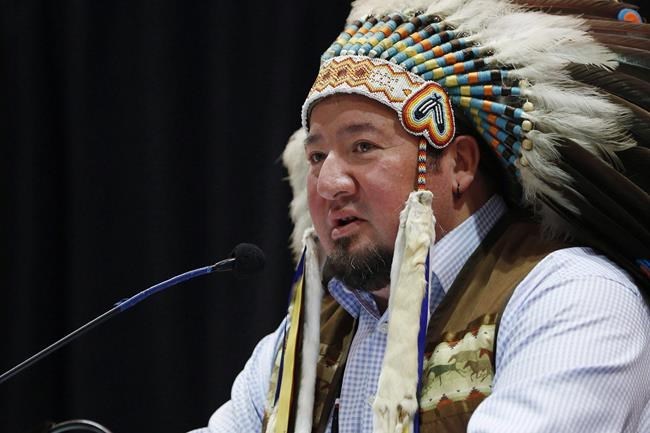MINEGOZIIBE ANISHINABE — Before the sun broke through the sky Monday morning, members of a Manitoba First Nation planned to start a critical month-long search in a good way.
Spiritual advisers were to lead a pipe ceremony in Minegoziibe Anishinabe while a sacred fire was to be lit near where potential graves of children forced to attend residential school may be.
The sacred fire is expected to burn for the entirety of the estimated four-week-long excavation of an area underneath the Catholic church where 14 anomalies were detected using ground-penetrating radar last year.
"This allows for a trauma-informed, spiritually and culturally sensitive approach to the work that we have to do in the community," Chief Derek Nepinak said before the ceremony.
Monday is about ensuring elders, survivors and intergenerational survivors of the former Pine Creek Residential School are provided support before ground is expected to be broken Tuesday.
The First Nation, northwest of Winnipeg, is working with archeologists and scientists from Brandon University to conduct the search. Nepinak said it's the same team that assists police when archeological digs and excavations are conducted in the province.
Before the excavation can start, the team has to "stage an area" where the dig will take place and where materials will be transported.
"It is a very meticulous and focused approach that they're using," said Nepinak.
He believes Minegoziibe Anishinabe is one of the first communities in Canada to begin excavating after detecting potential unmarked graves at former residential school sites.
An estimated 150,000 Indigenous children were forced to attend residential schools. More than 60 per cent of the schools were run by the Catholic Church.
Survivors of the schools have been speaking out for decades about the possibility of unmarked graves at the sites, prompting the Truth and Reconciliation Commission to release a report on missing children and unmarked burials in 2016.
But it wasn't until Tk'emlups te Secwepemc released it's findings of what is believed to be 215 unmarked burials at the former Kamloops Indian Residential School in British Columbia in 2021 that the country and the world took notice.
The federal government appointed Kimberly Murray as a special interlocutor on unmarked graves and committed to funding search efforts.
Murray's interim report last month outlined more than a dozen other First Nations that have begun ground searches, including one in Star Blanket Cree Nation in Saskatchewan where the partial remains of a child between the age of four and six were recovered.
Some communities are still grappling with next steps in their searching, with some elders expressing concerns about disturbing the ground where a child may lay in rest.
Nepinak said his community hosted multiple engagement sessions and questions came up that he and councillors were unable to answer.
As conversations continued, it became clear survivors needed to know the full truth of what happened.
"We hope that this process will bring some closure to some long-standing questions that people might have about what went on in our homeland and in our territory," said Nepinak.
The Pine Creek school was run by the Roman Catholic Church and operated from 1890 to 1969 in different buildings, including the church, on a large plot of land.
The National Centre for Truth and Reconciliation has a record of 21 child deaths at the school and survivors have long spoken about the abuse there.
The community's initial search also determined there were 57 additional anomalies found on the grounds around the church and old school site, but the First Nation is focusing its search on the church basement.
"Any human remains that are buried under the church don't belong buried under a church in our homelands," said Nepinak.
"We're doing this out of respect for human life and the dignity that humans are owed in their lifetime."
Minegoziibe Anishinabe has also been calling on the RCMP to investigate.
Mounties started an investigation last year with the aim of looking into any criminal activity that may be related to the 14 points of interest the community detected.
Police said Friday investigators were unable to uncover any evidence suggesting something criminal occurred.
They added officers would investigate anything potentially criminal that turns up in the dig.
If any remains are found, the community would work with the coroner's office on next steps, which may include DNA testing.
Whatever the turnout may be, Nepinak hopes the search will provide his nation with the "opportunity to heal and move forward in a better and stronger way."
The Indian Residential Schools Resolution Health Support Program has a hotline to help residential school survivors and their relatives suffering from trauma invoked by the recall of past abuse. The number is 1-866-925-4419.
— By Brittany Hobson in Winnipeg
This report by The Canadian Press was first published July 24, 2023.
The Canadian Press




